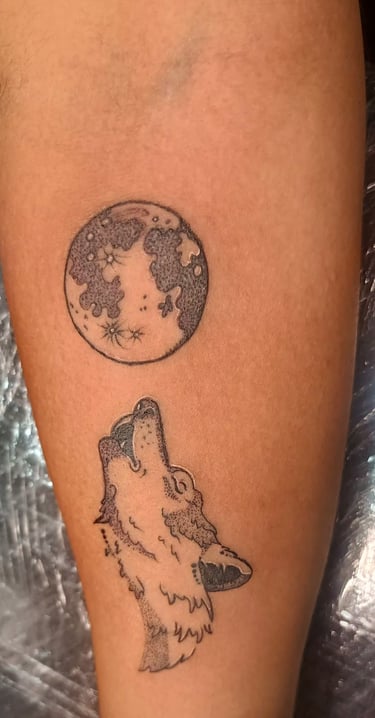The Safety of Getting a Tattoo During Pregnancy
I thoroughly researched and consulted experts about whether to get a tattoo while pregnant, as I had a strong desire for one. Initially, the lack of clear information online left me feeling confused. However, after reaching out to professionals, I reached a conclusion. Ultimately, I decided to get a tattoo of a wolf and the moon, symbolizing a semicolon. The semicolon holds significant meaning for writers like myself, representing that the story isn't over and that there is hope for the future. I chose the wolf for its representation of spiritual protection, strength, and loyalty, while the full moon symbolizes purity, dreams, mystery, and eternity.
MY EXPERIENCE
Tattoos have become increasingly popular in recent years, with more and more people choosing to express themselves through body art. However, when it comes to getting tattoos during pregnancy, there are important safety concerns that need to be addressed. In this article, we will explore the potential risks associated with getting tattoos while pregnant and provide you with valuable information to help you make an informed decision.
One common concern that people have about getting tattoos during pregnancy is the risk of infection. Pregnancy already weakens the immune system, making it more susceptible to infections. When unsterile tattoo needles are used, there is an increased risk of bacterial or viral infections, such as Hepatitis B, Hepatitis C, and HIV. It is crucial to ensure a safe and sterile tattooing environment by following FDA guidelines and ensuring that the tattoo artist uses clean and properly sterilized equipment.
Another concern is the potential complications that may arise from getting tattoos while pregnant. The body undergoes various physiological changes during pregnancy that can affect the healing process of a tattoo. Additionally, some individuals may experience allergic reactions to tattoo ink, which can further complicate the healing process.
It is important to note that there are no official guidelines on the best time for a tattoo during pregnancy. However, it is recommended to research reputable tattoo shops and artists who prioritize hygiene practices and sterile techniques. Proper aftercare is also essential for promoting healing and reducing the risk of complications.
By addressing these safety concerns related to getting tattoos during pregnancy, we aim to provide you with the necessary information to make an informed decision about whether or not to get a tattoo while pregnant. Remember, your safety and the health of your baby should always be a top priority.
Risks Associated with Getting Tattoos During Pregnancy
When you're thinking about getting a tattoo while pregnant, it's important to know about the potential risks involved. In this section, we'll explore the specific dangers and safety issues related to tattoos during pregnancy. Our goal is to provide you with essential information so that you can make a well-informed decision.
1. Risk of Infection from Tattoos During Pregnancy
Getting a tattoo during pregnancy increases the risk of infection from unsterile tattoo needles. It's important to understand that any type of infection can be very dangerous for both you and your baby. To reduce this risk, it's crucial to make sure that the tattooing environment is safe and sterile. Following the guidelines set by the Food and Drug Administration (FDA) is key to maintaining a safe environment for getting a tattoo while pregnant.
Recommendations for Ensuring a Safe and Sterile Tattooing Environment
Here are some steps you can take to ensure that the place where you're getting your tattoo is safe and sterile:
Research Reputable Tattoo Shops: Look for places that have a good reputation for maintaining high levels of cleanliness and following safety protocols.
Verify Compliance with FDA Guidelines: Make sure that both the tattoo artist and the shop strictly follow FDA guidelines for sterilizing equipment and keeping everything clean.
Use Sterile Equipment: Double-check that all needles, ink, and other materials used for the tattoo are brand-new and properly sterilized. This is important to prevent any chance of contamination.
Transmission of Bloodborne Infections through Contaminated Tattoo Equipment
Tattoo equipment that hasn't been cleaned properly can carry bloodborne infections, such as Hepatitis B, Hepatitis C, and HIV. These infections can have serious effects on both you and your developing baby. It's crucial for pregnant people to understand how risky these infections can be before deciding to get a tattoo.
In conclusion, it's extremely important to know about the higher risk of infection from unsterile tattoo needles during pregnancy. By taking strict safety precautions and making sure that FDA guidelines are followed, you can minimize these risks and create a safer environment for getting a tattoo while pregnant.
2. Potential Complications Associated with Getting Tattoos During Pregnancy
When thinking about whether it's safe to get a tattoo while pregnant, it's important to know about the possible problems that could come up:
Allergic Reactions: The immune system goes through big changes during pregnancy, which can make allergic reactions to tattoo ink more likely. These reactions might show up as redness, itching, or swelling around the tattooed area. It's important to think about the chance of being more sensitive to tattoo colors during this time.
Effects of Physical Changes: Pregnancy causes a lot of physical changes in the body, like hormones going up and more blood being produced. These changes can directly affect how a tattoo heals. For example, skin stretching and changes in skin texture might change how the tattoo looks after it's healed.
It's important to remember that these possible problems can be different for everyone and depend on each person's health. That's why it's a good idea for anyone who wants a tattoo while pregnant to talk to their doctor and understand their own risks before making any decisions.
Knowing about these potential problems can help people understand the risks involved and do what they can to stay safe if they choose to get a tattoo while pregnant.
Safety Precautions for Getting Tattoos During Pregnancy
When it comes to getting a tattoo during pregnancy, safety should be your top priority. Minimizing risks and ensuring safe tattooing practices are essential for the well-being of both you and your baby. Here, we'll discuss the vital safety precautions to consider when getting a tattoo while pregnant.
1. Researching Reputable Tattoo Shops and Artists
Before deciding on a tattoo studio or artist, thorough research is crucial. When you're pregnant, the stakes are even higher, so it's essential to take extra precautions. Here's how you can ensure a safe and positive experience:
Ask for Recommendations: Seek recommendations from friends or family members who have had positive experiences with getting tattoos during pregnancy. Personal referrals can provide valuable insights into reputable tattoo shops and skilled artists.
Check Online Reviews: Use online platforms to read reviews and testimonials from previous clients. Look for specific mentions of cleanliness, sterile practices, and the overall experience of pregnant individuals who have received tattoos at the studio.
Visit the Studio in Person: If possible, schedule a visit to the tattoo studio to assess its cleanliness and adherence to safety standards. Observe the general hygiene practices, sterilization of equipment, and the overall professionalism of the staff.
Verify Licenses and Certifications: Ensure that both the tattoo studio and the individual artist hold all necessary licenses and certifications required by local health authorities. This includes certifications for bloodborne pathogen training and proper handling of sterilization procedures.
Ask Questions: Don't hesitate to ask the artist or studio manager about their sterilization processes, ink quality, and any additional precautions they take when working with pregnant clients. A reputable establishment will be transparent and forthcoming with this information.
2. Emphasize Proper Hygiene Practices and Sterile Techniques
When it comes to getting a tattoo during pregnancy, maintaining strict hygiene standards is non-negotiable. Stress the importance of sterile techniques in all aspects of the tattooing process:
Needle Sterilization: Ensure that the tattoo artist uses single-use, disposable needles that are properly disposed of after each client. If reusable equipment is used, it must undergo thorough sterilization in an autoclave between uses.
Workstation Sanitization: The artist's workstation should be meticulously clean, with all surfaces disinfected before and after each procedure. Any non-disposable tools or equipment should undergo rigorous cleaning and sterilization processes.
Ink Quality: High-quality tattoo ink from reputable suppliers should be used to minimize the risk of adverse reactions or infections. Inquire about the ingredients in the ink to ensure it doesn't contain any harmful substances that could pose a risk during pregnancy.
By taking these precautionary measures, you can significantly reduce the potential risks associated with getting a tattoo during pregnancy while prioritizing your safety and well-being as well as that of your developing baby.
Importance of Proper Aftercare for Pregnant Women with Tattoos
After getting a tattoo during pregnancy, it is crucial to prioritize proper aftercare to minimize risks and ensure the health and safety of both the mother and the baby. The physiological changes that occur during pregnancy can impact the healing process of a tattoo, making it essential to follow safe tattooing practices and provide adequate aftercare.
Specific Aftercare Steps
Keep the Tattoo Clean:
Gently wash the tattooed area with mild, fragrance-free soap and lukewarm water.
Avoid scrubbing or using harsh cleansers to prevent irritation.
Moisturize Regularly:
Apply a thin layer of unscented, hypoallergenic moisturizer to keep the skin hydrated and promote healing.
Avoid exposing the tattoo to direct sunlight and tanning beds during the healing process.
Avoid Swimming and Soaking:
Refrain from soaking in bathtubs, hot tubs, or swimming pools until the tattoo is fully healed to prevent infection.
Follow Artist's Instructions:
Adhere to any specific aftercare instructions provided by the tattoo artist to ensure optimal healing.
Monitor for Signs of Infection:
Watch for symptoms such as excessive redness, swelling, or discharge from the tattooed area.
If any concerning symptoms arise, promptly seek medical attention.
Stay Hydrated and Eat Nutritious Foods:
Adequate hydration and a balanced diet can support overall healing and skin health.
Avoid Scratching or Picking:
Resist the urge to scratch or pick at scabs as this can disrupt the healing process and increase the risk of infection.
It's important for pregnant individuals considering tattoos to engage in open communication with their healthcare provider regarding aftercare recommendations tailored to their specific circumstances. Additionally, selecting a reputable tattoo shop with skilled artists who prioritize safe practices is essential for minimizing potential risks associated with getting a tattoo during pregnancy.
By following these aftercare guidelines and seeking professional advice when needed, individuals can take proactive steps towards ensuring a safe and healthy experience when getting a tattoo during pregnancy.
The Impact of Tattoos on Breastfeeding Mothers and Infants
Safety Considerations for Breastfeeding Mothers with Tattoos
When it comes to the safety of breastfeeding with tattoos, there are several considerations that mothers should keep in mind. While there is limited research specifically addressing this topic, it's important to approach the issue with caution and awareness.
1. Potential Risks
Some individuals may have concerns about whether tattoo ink can enter breast milk and potentially affect the infant. It's essential to understand that the molecules of tattoo ink are generally too large to pass into breast milk in significant amounts. However, if you have any specific concerns, consult with a healthcare professional for personalized advice.
2. Precautions
While there are no strict guidelines regarding breastfeeding with tattoos, some mothers may choose to avoid having tattoos on areas directly involved in breastfeeding, such as the chest or breasts. This choice is often based on personal preference and comfort rather than specific medical recommendations.
3. Impact on Infants
Research on the potential impact of tattoo ink on infants' health through breastfeeding is limited. However, if you have a history of allergic reactions or complications related to your tattoos, it's advisable to be cautious and observe any potential changes in your baby's well-being while breastfeeding.
4. Seeking Professional Advice
If you have any concerns about how your tattoos may relate to breastfeeding or if you experience any unexpected issues while nursing, don't hesitate to seek guidance from a lactation consultant or healthcare provider.
While there are no definitive guidelines regarding tattoos and breastfeeding, it's important for mothers to make informed decisions based on their individual circumstances and seek professional advice when needed.
Potential Risks of Heavy Metals in Tattoo Ink on Infant Health and Development
Tattoos obtained during pregnancy raise concerns about their potential impact on breastfeeding and the health of the infant. One specific concern is the presence of heavy metals in tattoo ink and how it may affect the developing brains of infants who are breastfed. Additionally, there have been questions about whether tattoos during pregnancy could be linked to adverse outcomes such as miscarriage or stillbirth.
Exploring the risks of heavy metals in tattoo ink
One of the main concerns regarding tattoos and breastfeeding is the potential exposure to heavy metals found in tattoo ink. Some common heavy metals found in tattoo ink include lead, mercury, cadmium, and arsenic. These metals can be toxic to the human body, especially when they enter the bloodstream.
When a breastfeeding mother has a tattoo containing heavy metals, there is a possibility that these metals could be transferred to her breast milk and subsequently ingested by her infant. The long-term effects of this exposure on infant health and development are not yet fully understood. However, studies have suggested that exposure to heavy metals during infancy can potentially affect brain development and lead to cognitive impairments.
Possible links between tattoos during pregnancy and adverse outcomes
While there is limited research specifically examining the relationship between tattoos obtained during pregnancy and adverse outcomes like miscarriage or stillbirth, some concerns have been raised. The primary concern is related to the potential introduction of harmful substances into the pregnant person's body during the tattooing process.
During pregnancy, any foreign substance introduced into the body has the potential to impact fetal development. In the case of tattooing, if there is a risk of contamination or reaction to tattoo ink, it could potentially have adverse effects on pregnancy outcomes. However, it's important to note that at this time, scientific evidence linking tattoos during pregnancy directly to miscarriage or stillbirth is lacking.
Remaining cautious and seeking professional advice
Given the lack of comprehensive research on the topic, it is essential for pregnant individuals to approach tattoos with caution. If you are considering getting a tattoo during pregnancy and breastfeeding, it is advisable to consult with your healthcare provider for personalized advice. They can provide guidance based on your specific health situation and help you make an informed decision.
While the potential risks associated with heavy metals in tattoo ink are a concern, it's important to note that not all tattoo inks contain high levels of these metals. Reputable tattoo artists often use quality ink that adheres to safety standards. By choosing a reputable tattoo shop and artist who prioritize hygiene and use safe tattooing practices, you can minimize potential risks.
Conclusion
When deciding whether to get a tattoo during pregnancy, it's important to carefully consider the potential risks and benefits. While there is a small chance of infection, allergic reactions, and potential harm to the baby's health, your safety should be the top priority.
It is highly recommended to consult with healthcare professionals before getting a tattoo while pregnant. They can offer personalized advice based on your specific situation and medical history. Their expertise will help you understand the potential risks involved with tattoos during pregnancy and make the best choice for both you and your baby.
To sum it up:
Understand the risks: Be aware that getting a tattoo during pregnancy carries potential risks such as infection and allergic reactions. These risks can be minimized by ensuring proper hygiene practices and using sterile techniques.
Choose a reliable tattoo shop and artist: Take the time to research and select a reputable tattoo shop with skilled artists who prioritize cleanliness and follow industry guidelines. This significantly reduces the risk of infection or other complications.
Follow proper aftercare: After getting a tattoo, following the right aftercare instructions is crucial for healing and reducing the risk of problems. Follow the specific steps recommended by your tattoo artist, which may include keeping the tattoo clean, moisturized, and shielded from excessive sunlight.
Ultimately, whether or not to get a tattoo during pregnancy is a personal decision. By putting your safety first, seeking guidance from healthcare professionals, and taking necessary precautions, you can make an informed choice that is best for you.


If any mothers have gotten tattoos while pregnant, we welcome your thoughts and suggestions. Please share your experiences below to help others make informed decisions.
Your reviews and support means alot.
Feedbacks :




